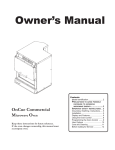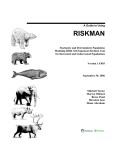Download Impatica for PowerPoint User`s Manual
Transcript
Impatica for PowerPoint User’s Manual Version 3.3.3 Impatica for PowerPoint Version 3.3.3 User’s Manual Copyright 2005 © Impatica Inc. All rights reserved Impatica for PowerPoint User’s Manual. The contents of this manual and associated Impatica for PowerPoint software are the property of Impatica Inc. and are copyrighted. All specifications, claims, features, representations and/or comparisons provided are correct to the best knowledge of Impatica as of the date of publication, but are subject to change without notice. INFORMATION IS PROVIDED BY IMPATICA ON AN “AS IS “ BASIS, WITHOUT ANY OTHER WARRANTIES OR CONDITIONS, EXPRESSED OR IMPLIED, INCLUDING BUT NOT LIMITED TO, WARRANTIES OF MERCHANTABLE QUALITY, SATISFACTORY QUALITY, MERCHANTIBILITY OR FITNESS FOR A PARTICULAR PURPOSE. IN NO EVENT SHALL IMPATICA INC. BE LIABLE FOR ANY LOSS OF REVENUE OR PROFIT OR ANY OTHER COMMERCIAL DAMAGE, INCLUDING BUT NOT LIMITED TO SPECIAL, INCIDENTAL, CONSEQUENTIAL OR OTHER DAMAGES. WE ARE ALSO NOT RESPONSIBLE FOR THE CLAIMS BY A THIRD PARTY. OUR MAXIMUM AGGREGATE LIABILITY SHALL NOT EXCEED THIRTY DOLLARS CANADIAN ($30 CDN). Mac, Macintosh and QuickTime are trademarks of Apple Computer, Inc. PowerPoint, Windows 98/NT/Me/2000/XP and Outlook are trademarks of Microsoft Corporation. Java is a trademark of Sun Microsystems. Netscape is a trademark of Netscape Communications Corporation. The Java Impatica for PowerPoint runtime is distributed in Eastridge Technology’s Jshrink format. This software is based in part on the work of the Independent JPEG Group. This product includes software developed by the Apache Software Foundation (http://www.apache.org/). The RIM and BlackBerry families of related marks, images and symbols are the exclusive properties of and trademarks or registered trademarks of Research in Motion Limited—used by permission. Version 3.3.3 i Impatica for PowerPoint Version 3.3.3 User’s Manual Table of Contents 1 Introduction............................................................................................................................. 1 2 What is Impatica for PowerPoint? ....................................................................................... 2 3 Installing Impatica for PowerPoint....................................................................................... 3 3.1 Launching the Installer ............................................................................................ 3 3.1.1 From a CD-ROM ........................................................................................... 3 3.1.2 From a Download .......................................................................................... 3 3.2 Using the Installer..................................................................................................... 3 4 Uninstalling Impatica for PowerPoint.................................................................................. 7 5 Using Impatica for PowerPoint............................................................................................. 8 5.1 Running Impatica for PowerPoint .......................................................................... 8 5.2 Registering Your Copy of Impatica for PowerPoint ............................................ 8 5.3 Selecting the Source Content Files for Conversion ............................................ 8 5.4 Conversion Settings................................................................................................. 9 5.4.1 Slide Show................................................................................................... 10 5.4.2 Media ........................................................................................................... 19 5.4.3 Extra Output Files........................................................................................ 25 5.5 Impaticizing Your Presentations .......................................................................... 28 5.6 Preview..................................................................................................................... 30 5.7 Deleting Impatica Files........................................................................................... 30 5.8 Conversion Summary ............................................................................................ 31 5.9 Web Server Upload Tab ......................................................................................... 32 5.9.1 Establishing a Connection to Your Web Server ........................................ 32 5.9.2 Navigating Through Files on Your Server.................................................. 34 5.9.3 Creating a New Folder on Your Server ...................................................... 34 5.9.4 Deleting a File or Folder From Your Server ............................................... 34 5.9.5 Uploading Files............................................................................................ 34 5.9.6 Previewing Files From Your Server............................................................ 35 5.10 Conversion Settings Tab ....................................................................................... 36 5.11 File Info Tab ............................................................................................................. 37 5.11.1 Source PowerPoint File .............................................................................. 37 Version 3.3.3 ii Impatica for PowerPoint Version 3.3.3 User’s Manual 5.11.2 Converted Impatica File .............................................................................. 37 6 5.12 E-mail Tab ................................................................................................................ 38 5.12.1 Attributes of the E-mail HTML .................................................................... 40 5.13 Check for Updates .................................................................................................. 41 Supported and Unsupported Features of PowerPoint ................................................... 42 6.1 Overview .................................................................................................................. 42 6.2 File Formats............................................................................................................. 42 6.2.1 Supported .................................................................................................... 42 6.2.2 Not Supported ............................................................................................. 42 6.3 Slides ........................................................................................................................ 42 6.3.1 Page Setup.................................................................................................. 42 6.3.2 Slide Masters............................................................................................... 43 6.3.3 Backgrounds................................................................................................ 43 6.3.4 Slide Design Templates .............................................................................. 44 6.3.5 Slide Layouts ............................................................................................... 44 6.4 Text ........................................................................................................................... 44 6.4.1 Text Types ................................................................................................... 44 6.4.2 Text Formatting ........................................................................................... 45 6.5 Graphics................................................................................................................... 46 6.5.1 Formats........................................................................................................ 46 6.5.2 Image Manipulation..................................................................................... 46 6.6 Shapes...................................................................................................................... 47 6.6.1 Shape Types ............................................................................................... 47 6.6.2 Shape Formatting........................................................................................ 47 6.7 Animation................................................................................................................. 48 6.7.1 Objects That can be Animated ................................................................... 48 6.7.2 Animation Effects ........................................................................................ 49 6.7.3 Animation Effect Options ............................................................................ 51 6.7.4 Timing .......................................................................................................... 51 6.8 Media ........................................................................................................................ 52 6.8.1 Supported .................................................................................................... 52 6.8.2 Not Supported ............................................................................................. 52 6.9 Action Settings and Hyperlinks............................................................................ 53 6.9.1 Supported .................................................................................................... 53 6.9.2 Not Supported ............................................................................................. 53 6.10 Transitions............................................................................................................... 54 6.10.1 Transition Effects......................................................................................... 54 6.10.2 Slide Advance.............................................................................................. 55 6.10.3 Sounds......................................................................................................... 55 6.11 Miscellaneous Features ......................................................................................... 56 Version 3.3.3 iii Impatica for PowerPoint Version 3.3.3 7 8 9 User’s Manual Building a Presentation for Internet Delivery................................................................... 57 7.1 Overview .................................................................................................................. 57 7.2 Animation................................................................................................................. 57 7.3 Navigation ................................................................................................................ 57 7.3.1 Navigating Between Slides ......................................................................... 57 7.3.2 Navigating Between Presentations ............................................................ 58 7.3.3 Navigating Between Presentations and URLs........................................... 59 7.3.4 Navigating Between Presentations and Other Files.................................. 59 7.4 Narration .................................................................................................................. 59 7.4.1 Sound Quality .............................................................................................. 59 7.4.2 Controlling Sound........................................................................................ 60 7.5 Keyboard and Mouse Input ................................................................................... 60 7.5.1 Keyboard Input in an Applet ....................................................................... 60 7.5.2 Mouse Input in an Applet ............................................................................ 60 7.6 Path and File Names............................................................................................... 60 Publishing Your Presentation for Web Delivery .............................................................. 62 8.1 Overview .................................................................................................................. 62 8.2 Setting up the HTML to Play Your Presentation Content ................................. 62 8.3 Testing...................................................................................................................... 63 8.3.1 Testing From Your Local Hard Drive.......................................................... 63 8.3.2 Testing From Your Web Server.................................................................. 64 8.4 Adding Impatica Content to Your Web Site ........................................................ 64 Tips and Tricks ..................................................................................................................... 65 9.1 Designing for Performance ................................................................................... 65 9.2 Selecting Slide Size ................................................................................................ 66 9.3 Reusing Objects...................................................................................................... 66 9.4 Pictures and Other Large Images......................................................................... 66 9.5 Narration .................................................................................................................. 67 9.6 Video......................................................................................................................... 68 9.7 Synchronization and Timing ................................................................................. 68 9.8 Internal and External Branching........................................................................... 69 9.9 Hyperlinks to Other Presentations....................................................................... 69 9.9.1 Specifying a PowerPoint Presentation ....................................................... 69 Version 3.3.3 iv Impatica for PowerPoint Version 3.3.3 9.9.2 9.9.3 10 User’s Manual Specifying an Impatica File......................................................................... 69 Hyperlink Considerations ............................................................................ 70 9.10 Setting up the Web Server..................................................................................... 70 9.11 Converting Unsupported Elements to Pictures ................................................. 71 9.12 Experiment with Conversion Settings ................................................................. 72 Product Technical Specifications ...................................................................................... 73 10.1 Supported Software................................................................................................ 73 10.2 System Requirements............................................................................................ 73 Version 3.3.3 v Impatica for PowerPoint Version 3.3.3 User’s Manual 1 Introduction This User’s Manual explains everything you need to know about using Impatica for PowerPoint to transform existing or newly developed Microsoft PowerPoint™ presentations for delivery over the Internet without plug-ins and at low bandwidth. It is not intended to teach you how to use PowerPoint. We presume that you already have adequate knowledge in that area. Here is what it does cover: • What Impatica for PowerPoint is, how to install it, how to run it, how it works and how to publish your content; • A list of PowerPoint features that are supported by Impatica for PowerPoint, and those which are not. In some cases, we even provide suggestions for working around the unsupported PowerPoint features; and • A collection of tips and tricks that we have found helpful for using Impatica for PowerPoint to convert PowerPoint presentations for web delivery, including some special guidance on using narration within your PowerPoint presentation. Version 3.3.3 1 Impatica for PowerPoint Version 3.3.3 User’s Manual 2 W h at is Impatica for Powe r Po i n t ? Impatica for PowerPoint is a software tool that allows Microsoft PowerPoint presentations to be played over the Internet or corporate intranets without plug-ins, at modem speeds as low as 28.8 kbps. More specifically, Impatica for PowerPoint is a standalone program, which runs on Windows 98/NT/2000/Me/XP and on Mac OS X*. Impatica for PowerPoint reads and interprets the PowerPoint file and produces a compressed file that can be streamed over the Internet, preserving the various multimedia elements, such as: text, graphic, audio, video, animation and interactivity. The new impaticized file can then be read by Impatica’s Java player applet (“ImPlayer”) and played in real time while the file is streaming over the Internet. Once you have created the impaticized version of your presentation, it can be played from any HTML web page or from within an e-mail message. No special server side software is required. Caution:To ensure faithful rendering of text fonts, the conversion process should be run on the same computer on which the PowerPoint presentation was created or, at least, should have all fonts that are used in the presentation installed on the system on which the conversion is being done. You may optionally choose to impaticize your presentation for delivery to BlackBerry handhelds. Once it has been converted to the BlackBerry file format, your presentation can be loaded directly onto a BlackBerry via USB or Bluetooth. It can also be uploaded to a web server so that the presentation can be loaded over-the-air from a link in a WML page or e-mail message. Version 3.3.3 2 Impatica for PowerPoint Version 3.3.3 User’s Manual 3 Installing Impatica for Powe r Po i n t 3.1 Launching the Installer 3.1.1 From a CD-ROM Open the folder “Impatica for PowerPoint”. Double-click on the file “setupppt.exe”. 3.1.2 From a Download The file “setupppt.exe” is a standard installation package. Simply double click on the file icon to begin the install process. 3.2 Using the Installer To begin the installation, click Next on the first screen of the Setup Wizard. You will then be presented with the Software License Agreement for Impatica for PowerPoint. You must select the “I accept the terms of the license agreement” option and click Next in order to proceed with installation. Version 3.3.3 3 Impatica for PowerPoint Version 3.3.3 User’s Manual You will then be prompted for a directory in which to install the files. The default directory is C:\Program Files\Impatica for PowerPoint 3.3.3. If you wish to change the destination directory, click the Change button and select a different destination folder (otherwise click the Next button). Version 3.3.3 4 Impatica for PowerPoint Version 3.3.3 User’s Manual Once you are confident that you have specified the correct settings, click the Install button to proceed with the installation. If you need to modify any of your settings, click the Back button to return to the appropriate screen. Impatica for PowerPoint will now begin to install on your machine. To halt this process, press the Cancel button. When the setup is complete, the following dialog box will appear: Version 3.3.3 5 Impatica for PowerPoint Version 3.3.3 User’s Manual Here, you can choose to launch Impatica for PowerPoint and to see the Readme file. To complete the process, click Finish. Version 3.3.3 6 Impatica for PowerPoint Version 3.3.3 User’s Manual 4 Uninstalling Impatica for Powe r Po i n t To uninstall Impatica for PowerPoint, from the Start menu, choose Settings and then Control Panel. From the Control Panel, double click on Add/Remove Programs. In the Add/Remove Programs dialog box, select “Impatica for PowerPoint 3.3.3” from the list of “Currently installed programs”. Then click Change/Remove. Version 3.3.3 7 Impatica for PowerPoint Version 3.3.3 User’s Manual 5 Using Impatica for Powe r Po i n t Impatica for PowerPoint is a software program that reads Microsoft PowerPoint files and converts them into a compressed and web-friendly format. Once converted, the impaticized presentations can be embedded into web pages for efficient and plug-in free delivery over the Internet or corporate intranets. Impatica for PowerPoint presentations can also be sent as e-mail messages to specific recipients. Once you have installed Impatica for PowerPoint, you are ready to convert PowerPoint presentations for Internet delivery. Note: 5.1 PowerPoint 97, 2000, 2002 (“XP”), 2003 and X files are supported. However, presentations saved as “PowerPoint 97-2000 & 95 presentation” and PowerPoint 98 for Macintosh files are not supported. Running Impatica for PowerPoint To impaticize a PowerPoint presentation, launch Impatica for PowerPoint from your Start Menu or desktop icon. Alternatively, you can drag and drop one or more “.ppt” files onto the Impatica for PowerPoint desktop icon to invoke the application. 5.2 Registering Your Copy of Impatica for PowerPoint Each copy of Impatica for PowerPoint must be registered as either an evaluation copy or a licensed copy before it can be used. The first time that you run Impatica for PowerPoint, you will be prompted to accept the software license agreement and to enter your registration information. It is important that you enter your Name, Organization and Registration Code exactly as they were provided to you, including spaces and case sensitivity. Copies that were previously registered as evaluation copies can be re-registered as licensed copies without re-installation. To change the registration information for your copy of Impatica for PowerPoint, click on the Registration Code… button. In the dialog box that appears, enter your Name, Organization and Registration Code exactly as they were provided to you, including spaces and case sensitivity. Then click OK. 5.3 Selecting the Source Content Files for Conversion The source PowerPoint Files list displays the names of the files to be impaticized. When you launch Impatica for PowerPoint by using the drag and drop technique, the files that had been dropped onto the program icon will automatically appear in this list. Version 3.3.3 8 Impatica for PowerPoint Version 3.3.3 User’s Manual You can add PowerPoint files to the list as often as you wish. Simply click the Add… button or drag and drop files onto the Source PowerPoint Files list. To remove files from the Source PowerPoint Files list, select the desired file and click the Remove button. 5.4 Conversion Settings In addition to selecting all of the files you wish to impaticize, there are a number of conversion settings that you can select. These options are grouped and presented on three tabs: Slide Show, Media and Extra Output Files. These settings can be selected individually for each file being converted. Simply select the file from the source file list and apply the appropriate settings. Each tab includes Apply to All and Save as Default buttons. Click the Apply to All button to apply the settings on the current tab to all of the files displayed in the Source PowerPoint Files list. To create default settings, click the Save as Default button. Once saved as the defaults, the settings on the current tab will be applied to any additional files added to this batch of Version 3.3.3 9 Impatica for PowerPoint Version 3.3.3 User’s Manual source files and will be the default settings for this tab when you run Impatica for PowerPoint in the future. 5.4.1 Slide Show The Slide Show tab houses general options that pertain to the overall presentation and to the function of the Impatica for PowerPoint converter. 5.4.1.1 Save Location You can specify the location on your computer in which the resulting Impatica file will be saved. To change the save location for a file, select the file in the Source PowerPoint Files list, then click the Browse… button. Version 3.3.3 10 Impatica for PowerPoint Version 3.3.3 User’s Manual To save the converted file in the same location as its source file, click the Source Folder button. Note: 5.4.1.2 Impatica for PowerPoint does not prompt when overwriting an existing Impatica file, unless you specify the save location by clicking the “Browse…” button. Impatica File Format This option allows you to specify in which format you would like to save the impaticized presentation. Version 3.3.3 11 Impatica for PowerPoint Version 3.3.3 User’s Manual New Impatica file format (-imp.jar) With this option selected, the impaticized presentation will be stored in a file with the extension “-imp.jar”. This file will simply replace the classic Impatica file and will playback through an HTML page using the Impatica player applet. The “-imp.jar” file is a package that contains the impaticized presentation and the Impatica player applet. Since the file includes both of these components, it can be distributed as a stand-alone file, for example as an e-mail attachment. The presentation will play automatically when the file is double-clicked. Playback of the presentation as a stand-alone file requires that a Java run-time environment such as the Sun Java run-time environment, be installed on the viewing computer. The Microsoft JVM is not supported. Classic Impatica file format Version 3.3.3 12 Impatica for PowerPoint Version 3.3.3 User’s Manual When this option is selected, the impaticized presentation will be an Impatica file with the extension “.imp”, which is Impatica’s classic format that has been used in previous versions of Impatica for PowerPoint. BlackBerry file format In version 3.3.3, there is a new output format choice. When this option is selected, the impaticized presentation will be stored to disk as two files, with the extensions “.alx” and “.cod”. The files make it possible to use the Research In Motion BlackBerry handheld to view your presentation. The presentation can now be loaded onto a BlackBerry by using the Application Loader supplied with the BlackBerry Desktop Manager. 5.4.1.3 Include Playback Controls Selecting this option causes Impatica for PowerPoint to include a strip of buttons to the impaticized presentation that will allow the viewer to control the playback of your presentation. The controls consist of VCR-like buttons that allow the viewer of your presentation to (from left to right on the console): rewind the presentation (move to the first slide), move to the previous slide, pause/play the presentation, and move to the next slide. There is also a mute button on the far right side of the playback controls. Version 3.3.3 13 Impatica for PowerPoint Version 3.3.3 User’s Manual If this option is selected, you will be permitted to choose the Foreground and Background colors for the playback controls. A preview of the button layout and color scheme is shown in the Playback Controls area. When setting colors, you may select from the preset colors on the Swatches tab, or tailor your colors by modifying the values on the HSB (Hue, Saturation, Brightness) and RGB (Red, Green, Blue) tabs. Version 3.3.3 14 Impatica for PowerPoint Version 3.3.3 5.4.1.4 User’s Manual Target screen dimensions New to version 3.3.3, it is now possible to specify the dimensions of the device to which the presentation will be delivered. The translated presentation will be scaled to fit within the specified size. The choices available are: Version 3.3.3 15 Impatica for PowerPoint Version 3.3.3 User’s Manual Automatic When this is selected, the presentation will not be scaled. It will maintain the dimensions of the original PowerPoint presentation. However, if this choice is selected, and if “BlackBerry file format” is selected as the Impatica File Format, the size of the presentation will be limited to 240 x 240. BlackBerry 7100 Series (240 x 260) This will produce a presentation sized to fit within 240 x 260, optimally sized for a BlackBerry 7100 Series handheld. BlackBerry 7100 Series Landscape (260 x 240) This will produce a presentation sized to fit within 260 x 240, but rotated 90° clockwise to show the presentation in landscape mode on the BlackBerry 7100 Series handheld. Version 3.3.3 16 Impatica for PowerPoint Version 3.3.3 User’s Manual BlackBerry 7200 Series (240 x 160) This will produce a presentation sized to fit within 240 x 160, optimally sized for a BlackBerry 7200 Series handheld. BlackBerry 7200 Series Landscape (160 x 240) This will produce a presentation sized to fit within 160 x 240, but rotated 90° clockwise to show the presentation in landscape mode on the BlackBerry 7200 Series handheld. BlackBerry 7700 Series (240 x 240) This will produce a presentation sized to fit within 240 x 240, optimally sized for a BlackBerry 7700 Series handheld. BlackBerry 7700 Series Landscape (240 x 240) This will produce a presentation sized to fit within 240 x 240, but rotated 90° clockwise to show the presentation in landscape mode on the BlackBerry 7700 Series handheld. Pocket PC Browser (238 x 230) This will produce a presentation sized to fit within 238 x 230, optimally sized for a Pocket PC Browser. Sharp Zaurus (238 x 230) This will produce a presentation sized to fit within 238 x 230, optimally sized for a Sharp Zaurus. 5.4.1.5 Loading Color During playback, while the Impatica player applet is loading the first segment of the presentation, a loading indicator will be shown in the presentation area. The loading indicator consists of two parts, as shown below: a colored background (1), and a spinning “pinwheel” (2). Version 3.3.3 17 Impatica for PowerPoint Version 3.3.3 User’s Manual 1 2 The Loading Color… button allows you to select the color of the colored background (1) portion of the loading indicator. The spinning “pinwheel” (2) will be automatically set to a color that is complementary to the background color. The color selector panel is similar to the one presented for selecting the Foreground and Background colors for the Playback Controls (see Section 5.4.1.3) Version 3.3.3 18 Impatica for PowerPoint Version 3.3.3 User’s Manual 5.4.2 Media 5.4.2.1 Wait for Sound Impatica for PowerPoint’s Wait for Sound options enable the precise synchronization of narration with the presentation. By waiting for the sound to complete before advancing to the next animation or the next slide, it is guaranteed that sound will not be cut-off and that the presentation will remain precisely synchronized across all receiving platforms. At end of animation With this option selected, presentation advancement will be delayed until the current animation’s sound has been played to its entirety. For presentations converted with animation playback set to PowerPoint 2002 (XP) and 2003 (see below), the presentation will wait for animations before a new animation started “after previous” or “on mouse click”. Animations set to start “with previous” are considered to be a part of the same animation sequence as the preceding animation. Version 3.3.3 19 Impatica for PowerPoint Version 3.3.3 User’s Manual At end of slide Selecting this option causes slide transitions to be postponed until the current slide’s transition sound has finished playing. This setting is highly recommended for most narrated presentations. 5.4.2.2 JPEG Images JPEG Quality You can specify the quality to be applied to JPEG images. For most images, 70% quality will result in significant compression without a significant loss of quality. Always Recompress When this option is selected, Impatica for PowerPoint will automatically recompress all of the JPEG images in the presentation. If it is not selected, only those JPEG images that have been scaled or cropped within PowerPoint will be recompressed. Recompressing decreases the file size, but also degrades the quality of the image. 5.4.2.3 Animation Playback The Animation Playback options determine the timing and appearance of animations in the impaticized presentation. They allow you to specify which version of PowerPoint you wish to mimic. PowerPoint 97, 2000 and X With this option selected, the presentation will play as it would if the PowerPoint presentation was viewed in either PowerPoint 97, 2000 or X. Timings of animations will match the timing of the playback in those versions of PowerPoint. In this mode, animation effects new in PowerPoint 2002 (“XP”) and 2003 will be ignored, as they would be upon playback in PowerPoint 97, 2000 or X. PowerPoint 2002 (“XP”) and 2003 Presentations impaticized with this option selected will exhibit the same timing as playback of the PowerPoint presentation in PowerPoint 2002 (“XP”) or 2003. Furthermore, animation effects that were new to PowerPoint 2002 (“XP”) and 2003 will be maintained. 5.4.2.4 Video Encode for: Version 3.3.3 20 Impatica for PowerPoint Version 3.3.3 User’s Manual Selecting this option directs Impatica for PowerPoint to convert any embedded videos found within the source PowerPoint presentation. A target speed must then be selected, and will be applied to all converted videos. The following options are available only if video encoding has been selected. 1 2 3 Target Connection Speed (1) The Target Connection Speed (kbps) refers to the expected or desired connection speed over which the Impaticized presentations are to be viewed. There are several pre-selected standard speeds - the “Still” option is included for very low bandwidth applications in which it may not be possible to achieve reasonable quality video. This option will convert the sound and first frame of the video. To set a custom target connection speed, simply type in the desired value. Frame Rate (2) The frame rates displayed in the Frame Rate box represent a range of values, from 1 to File. If the File option is selected, the frame rate used for conversion will be that of the original Version 3.3.3 21 Impatica for PowerPoint Version 3.3.3 User’s Manual AVI video file(s). The other rates presented are rough guidelines only, and will be mapped to specific values during impaticization. For example, selecting Med will cause Impatica for PowerPoint to select frame rates that are near the middle of the range of possible values for each video referenced in the source PowerPoint presentation. Note: Only frame rates that are factors of the source are possible. Network Overhead % (3) Your network overhead may vary depending on the type of network or device connection used. Default values of network overhead for Internet delivery will be displayed in the Network Overhead (%) box and may be altered accordingly. As a general rule, you may wish to start with the values as presented in the interface. The following table suggests network overhead settings for various output devices. Output Target (kbps)/ Network/Device Type Network Overhead (%) Still Not Applicable 56 20 - 25 64 20 - 25 128 15 - 20 256 10 - 15 LAN 5 - 10 CD-ROM/CD-R 0 Hard Disk 0 5.4.2.5 Make Hyperlinks Open New Window If this option is selected, all hyperlinks to URLs will open a new browser window and display the desired page within the new window. Otherwise, the target URL will appear in the current browser window and replace its content, including the Impatica presentation. It is highly recommended that this feature be selected when producing content for e-mail delivery. Some e-mail clients can only open hyperlinks that are specifically set to open within a new page. Version 3.3.3 22 Impatica for PowerPoint Version 3.3.3 5.4.2.6 User’s Manual Make All Animations Automatic Selecting this option will cause Impatica for PowerPoint to override the animation on mouse click setting of PowerPoint. If this option is selected, all animations will occur automatically, without waiting for a mouse click. This setting is useful for quickly publishing presentations designed for stand-up presentations, where a speaker is meant to advance the slides for the audience. Simply selecting this option will eliminate the need to have the audience click for animations. 5.4.2.7 Sound Format New to version 3.3.3, the choice of sound formats has been expanded. The three available choices are: Compact Version 3.3.3 23 Impatica for PowerPoint Version 3.3.3 User’s Manual When this option is selected, Impatica for PowerPoint will convert sound objects to Impatica’s compact sound format, which is designed for streaming sound over the Internet. AU µLaw (5 x Compact size) When this choice is selected, sound will be converted using a larger, but higher quality sound format than that produced using the “Compact” sound setting. This choice would be most suitable within a controlled network where a sizeable bandwidth is always available to the end users. WAV PCM (10 x Compact size) When this option is selected, sound will be converted to the highest quality sound format, but with the highest file size. This would be appropriate when distributing content via CD-ROM or within a network with extremely high bandwidth. Note: Audio is ignored for BlackBerry format presentations. Version 3.3.3 24 Impatica for PowerPoint Version 3.3.3 User’s Manual 5.4.3 Extra Output Files 5.4.3.1 Generated Support Files HTML file Selecting this option will cause Impatica for PowerPoint to create an HTML file that can be used to preview the impaticized file that was saved on your local drive. The HTML file will be saved in the same folder as the corresponding Impatica file. Zip package When this option is selected, Impatica for PowerPoint will create a zip package that contains the impaticized presentation, the Impatica player applet and an HTML page for launching the presentation. The ZIP file will be saved in the same folder as the corresponding Impatica file. Once this zip package has been created, it can be used to upload the presentation to a learning management system (“LMS”). For details on using impaticized presentations in an LMS, Version 3.3.3 25 Impatica for PowerPoint Version 3.3.3 User’s Manual please refer to the tutorials section of the Impatica web site: http://www.impatica.com/support/tutorials.html SCORM package Select this option to produce a SCORM conformant sharable content object. This package can be used within a SCORM conformant learning management system. The SCORM package will have the extension “-scorm.zip” and will be located in the same folder as the corresponding Impatica file. The package produced includes generic meta-data. To edit the meta-data, unzip the package using a tool such as WinZip, then open and edit the metadata.xml file using a text editor. Rezip the package once the changes are complete. For more information about SCORM, please visit www.adlnet.org/ BlackBerry web files This option will only be enabled if the Impatica File Format selected is “BlackBerry File Format”. When selected, this option will create a new folder on disk in the destination folder called “<name of your presentation>-webassets”, and then will store all assets needed for web delivery of BlackBerry presentations to this folder. This is useful in situations where it is not convenient to upload to a server using Impatica for PowerPoint’s built in FTP capabilities. Using this option and storing the needed files to disk instead allows the use of another method to publish the impaticized PowerPoint presentation for delivery to BlackBerry handhelds. .ipk package This option produces a file that is suitable for viewing on Sharp Zaurus handheld devices. The file will be saved in the same folder as the corresponding Impatica file. Impatica for PowerPoint enables you to select an icon that will be displayed when the .ipk file has been loaded onto the Sharp Zaurus. To select your own icon, click the Browse… button. The selected file must be a PNG image and should have dimensions equal to or less than 32 x 32 pixels. To use the default Impatica icon, click Use Default Icon. 5.4.3.2 Exported Notes HTML file When this option is selected, Impatica for PowerPoint will extract text from the Notes section of the PowerPoint presentation, and present this text formatted in an HTML page. The HTML file will be saved in the same folder as the corresponding Impatica file. After conversion, using the “Put Other” functionality in the web server upload tab (see Section 5.9.5, Uploading Files), this HTML file can be uploaded to your FTP server, and offered to Version 3.3.3 26 Impatica for PowerPoint Version 3.3.3 User’s Manual your audience as an alternate way to convey the key points of your presentation in a convenient and easily viewed format that is also accessible to screen readers. Plain text file Much like the Exported Notes: HTML file option, selecting this option saves the extracted text from the Notes section of the PowerPoint presentation as a plain text file. The text file will be saved in the same folder as the corresponding Impatica file. This extracted text can now easily be entered into other applications, or uploaded to your FTP server using “Put Other” (see Section 5.9.5, Uploading Files) as an alternate format for distributing the information contained in your presentation. OnCue script file If this option is selected, Impatica for PowerPoint will extract text from the Notes section of your source PowerPoint file, and generate a tagged Impatica script file, for use in Impatica OnCue (visit www.impatica.com for more information on Impatica OnCue). The Impatica script file will contain the Notes text, with tags inserted to denote slides and paragraphs, as extracted from the PowerPoint file. The first slide and all title slides will be set to top-level sections in the script file, while other slides will become subsections. These section markings in the script file will be used for synchronization of the Impatica OnCue presentation, and will be used to build a menu for navigation within the OnCue presentation (refer to the Impatica OnCue User’s Manual for further information). If there is no text in the Notes, a skeleton script file is generated so that the synchronization can be maintained, but no text will appear in the scrolling text during the OnCue presentation playback. The “Include paragraph cue points” checkbox is only enabled for selection if you have checked the “OnCue script file” box. Selecting Include paragraph cue points instructs Impatica for PowerPoint to include synchronization tags for every paragraph in the script file (as extracted from the Notes portion of the source PowerPoint file). If the box is left unchecked (but the OnCue script file box is checked), there will be no synchronization tags included with the paragraph tags in the generated script file. If you wish to mark some (but not all) paragraphs with synchronization tags, leave this box unchecked, and edit the OnCue script file manually to insert your synchronization tags. See the Impatica OnCue User’s Manual for further information on using and editing Impatica script files. Version 3.3.3 27 Impatica for PowerPoint Version 3.3.3 5.5 User’s Manual Impaticizing Your Presentations Once you have added all of the files that you wish to convert to the Source Files list and have set the desired conversion settings, click Impaticize. When you click the Impaticize button, the Conversion Progress screen will appear showing the progress as each presentation is impaticized. In some cases, it may take a few moments for progress to begin showing. Below the progress bars, the source and destination file names and conversion settings are displayed. Encoding of embedded videos, if it is enabled, will be performed following the conversion of all of the slides in the source presentation. During the video encoding, the progress and description of each video file are displayed. If the Blackberry file format is the selected Impatica File Format, then the conversion to BlackBerry format will occur immediately following the conversion of all slides in the source Version 3.3.3 28 Impatica for PowerPoint Version 3.3.3 User’s Manual presentation. This will happen automatically if that output format is selected, and will be reflected in the progress indicator. You can use the Skip or Skip Remaining buttons to interrupt the conversion process. Skip will stop the conversion of the current file, while Skip Remaining will halt conversion of the current file and all remaining files. In each case, any files that have already been impaticized are unaffected. When all files have been impaticized or skipped, a new panel will appear, presenting several options: 1. preview the impaticized presentations; 2. delete one or more converted files; 3. upload files to a web server; 4. view file information, 5. view the conversion settings used; and Version 3.3.3 29 Impatica for PowerPoint Version 3.3.3 User’s Manual 6. view the HTML required for sending your presentation by e-mail. 1 2 4 5 6 3 5.6 Preview To view the Impaticized presentations simply click the Preview button. Normally, Internet Explorer will be launched and the selected Impatica file will be played. If the output format selected is “BlackBerry file format,” the presentation will be shown using Impatica’s own viewer. 5.7 Deleting Impatica Files To delete any impaticized files, select the Impatica file you wish to delete and click the Delete File button. Any associated files, such as HTML files, will also be removed from your computer. Version 3.3.3 30 Impatica for PowerPoint Version 3.3.3 5.8 User’s Manual Conversion Summary Impatica for PowerPoint produces a conversion summary to report the successes, warnings and problems encountered during conversion. The conversion summary will appear automatically after conversion if any warnings or problems occurred during conversion. To view the conversion summary, in the File menu, choose “Show Conversion Summary”. The conversion summary will appear, displaying the results of the conversion. Version 3.3.3 31 Impatica for PowerPoint Version 3.3.3 5.9 User’s Manual Web Server Upload Tab 5.9.1 Establishing a Connection to Your Web Server Before you can upload your Impatica files or applet to your FTP server, you must first establish a connection to the server. This may require some assistance from your technical support person. Click on the Connect button on the Web Server Upload tab. The following dialog box will appear: The connect dialog box will present you with the information for your default account or for a new account if no accounts have been previously specified. From the Account menu, which can be accessed by clicking on the button at the right of the Account Name field, you can choose to create a new account, delete the current account, make the current account the default or choose a different account. Version 3.3.3 32 Impatica for PowerPoint Version 3.3.3 User’s Manual For each account, you must specify values for the following settings: • FTP Server Name; • FTP Port (Optional); • FTP User Name; • FTP Password; • Web Documents Folder; • Web Site Location; • Connection Type; • Upon connecting, ensure Impatica applet is on server; and • Remember Password. If you are uncertain about any of these values, please contact your web master or service provider for details. The FTP Server Name is the domain name or numerical IP address of the FTP server to which you wish to upload the impaticized files, e.g., “ftp.yourserver.com”. The FTP Port is an optional parameter that may be required due to the unique set-up of your FTP server. The default value is port 21. Normally, this field is left blank. The FTP User Name and FTP Password are used to authenticate your identity when connecting to the FTP server. The Web Documents Folder is the public folder on the FTP server that contains HTML and supporting files that are published to the web site. This field must contain the name of the folder or be left blank when the web documents folder coincides with the FTP home folder. The FTP home folder is the folder that is presented upon connecting to the FTP server. The Web Site Location is the address (URL) for the web server (HTTP server). It is the address value you supply to a web browser to view the top page of your web site. The Connection Type can be set to Active or Passive. Active is the default connection type that will be applicable to most FTP servers. In certain cases, especially with firewalls, you may have to use a passive connection. Generally, if an active connection fails, the protocol will automatically revert to passive. The Upon connecting, ensure Impatica applet is on server setting specifies whether or not Impatica for PowerPoint should verify that the applet files exist on the FTP server. When this option is selected, the files will be automatically uploaded if they are not already on the server. The Remember Password checkbox allows you to indicate either to save an encrypted version of your password with the other settings or to omit the password from saving. Version 3.3.3 33 Impatica for PowerPoint Version 3.3.3 User’s Manual If you make any changes to your accounts, you will be prompted to save changes upon clicking Connect or Cancel. 5.9.2 Navigating Through Files on Your Server To open a folder on the server, select it from the list and click Open. Alternatively, you may double-click on the folder. 5.9.3 Creating a New Folder on Your Server To create a new folder, first navigate to the appropriate location. Click the New Folder button. Enter the desired folder name and click OK. 5.9.4 Deleting a File or Folder From Your Server To delete any file or folder from your server, simply select it and click Delete. If you choose to delete a folder, all of its contents must be deleted before deleting the folder itself. 5.9.5 Uploading Files To upload one or more Impatica files, you must first navigate to the appropriate location on your FTP server. To upload the HTML required to launch your presentation, ensure that the Include HTML checkbox is selected. To upload the currently selected Impatica file, simply click Put File. To upload the whole list of impaticized files, click Put All Files. If the presentation to be uploaded is in BlackBerry format, then three types of files will be uploaded: a .wml file, a .jad file, and one or more .cod files. To view the presentation on a BlackBerry handheld, enter the URL of the .wml file for this presentation into the built-in browser on the BlackBerry and navigate to it. This will present you with a link to easily install this presentation on your handheld. For a quick way of obtaining the URL of a particular file on your server, see Section 5.9.6, Previewing Files From Your Server. In preparation for delivery to BlackBerry handhelds, ensure that your server administrator has configured the MIME types on the server as follows: text/vnd.sun.j2me.app-descriptor .jad text/vnd.wap.wml .wml application/vnd.rim.cod .cod Version 3.3.3 34 Impatica for PowerPoint Version 3.3.3 User’s Manual The Put Other… button can be used to upload any type of file, for example: • Previously impaticized files • Custom HTML • PowerPoint notes that were converted to HTML or text during conversion Simply click the Put Other… button and choose a file from the Open dialog box that appears. 5.9.6 Previewing Files From Your Server To view an Impatica file from your server, select the desired HTML file from the list of remote files. Click the Open button or double click on the HTML file. The HTML file will open in Internet Explorer. For any other file type, the following dialog box will open, showing the URL of the currently selected file. Version 3.3.3 35 Impatica for PowerPoint Version 3.3.3 User’s Manual 5.10 Conversion Settings Tab The Conversion Settings tab lists all of the options that were set for the creation of the currently selected converted Impatica file. To review the settings for a different file, select it from the Converted Impatica Files list while the Conversion Settings tab is visible. This tab is particularly useful when impaticizing the same file with multiple sets of conversion settings. It helps identify which mix of settings best suit your needs. Version 3.3.3 36 Impatica for PowerPoint Version 3.3.3 User’s Manual 5.11 File Info Tab The File Info tab provides you with information regarding the source PowerPoint file, and the resulting Impatica file. To view the information for a different file, select it from the converted files list while the File Info tab is visible. 5.11.1 Source PowerPoint File The name, size, and modification date of the source PowerPoint file are provided for identification and comparison with the resulting Impatica file. In addition, the total conversion time is listed. 5.11.2 Converted Impatica File The information provided to describe the converted Impatica file depends upon the Impatica file format selected. Version 3.3.3 37 Impatica for PowerPoint Version 3.3.3 User’s Manual For a file converted in the new Impatica file format (“-imp.jar”), the following information is provided: • The Name of the converted Impatica file; • The Presentation size in kilobytes, bytes and as percentage of the source PowerPoint file, which indicates the size of the content portion of the package; • The ImpViewer size in bytes, which indicates the applet portion of the file; • The Total package size in bytes, which indicates the complete size of the “-imp.jar” file; and • The Transfer time, which indicates the total time that it will require viewers of the presentation to obtain all of the presentation data over a dial-up modem. Use this value to gauge the performance of your presentation over slow connections. If the desired playback time is less than this transfer time, your viewers will experience some unplanned delay during the presentation. If this is the case, and some of your target audience has a slow connection, consider reworking the design of your presentation. See Section 9, Tips and Tricks. For a file impaticized in the classic Impatica file format (-“.imp”), the following information is provided: • The Name of the converted Impatica file; • The Presentation size in kilobytes, bytes and as percentage of the source PowerPoint file, which indicates the size of the converted Impatica file; and • The Transfer time, which indicates the total time that it will require viewers of the presentation to obtain all of the presentation data over a dial-up modem. Use this value to gauge the performance of your presentation over slow connections. If the desired playback time is less than this transfer time, your viewers will experience some unplanned delay during the presentation. If this is the case, and some of your target audience has a slow connection, consider reworking the design of your presentation. See Section 9, Tips and Tricks. 5.12 E-mail Tab When you use Impatica for PowerPoint to send your content by e-mail, the content is not embedded in the e-mail message, nor is it attached to it. Rather, the e-mail contains a few lines of HTML code that refer to your converted presentation. Upon uploading your file, this HTML code will be automatically generated by Impatica for PowerPoint. To view the HTML required to e-mail your presentation, select the E-mail tab and choose the desired file from the list of converted files. The e-mail HTML will only appear once the file has been uploaded (see Section 5.9, Web Server Upload Tab for upload instructions). Version 3.3.3 38 Impatica for PowerPoint Version 3.3.3 User’s Manual To copy the HTML required for e-mail to the clipboard, click the Copy button. You can now switch to the HTML editor portion of your e-mail client, if it exists, and paste the HTML. Alternatively, you may wish to save the e-mail HTML as a text file. To do so, click the Save… button, choose an appropriate location and name and click Save. Version 3.3.3 39 Impatica for PowerPoint Version 3.3.3 User’s Manual If the presentation is a BlackBerry presentation, then this tab will look like this: The text displayed in this case can be copied and pasted into your e-mail client as described previously. At this point, the e-mail can be sent to any BlackBerry device where the user can then navigate to the link contained in the e-mail and install the presentation on their handheld. 5.12.1 Attributes of the E-mail HTML To ensure that your Impaticized presentation will be received and enjoyed by the widest possible audience, the e-mail HTML generated by Impatica for PowerPoint includes several nuances to address the following issues: • Informing the recipients that the e-mail contains rich media content; • Dealing with e-mail clients that cannot display rich media content. Version 3.3.3 40 Impatica for PowerPoint Version 3.3.3 User’s Manual 5.12.1.1 Notification of Rich Media Content The recipients of your rich streaming e-mail may not be expecting a narrated, animated message. To inform your viewers, Impatica for PowerPoint includes the message “This e-mail contains a rich media presentation.” In addition, in your e-mail message editor, you may want to add text such as: “Please ensure that your sound is turned up and that you are online.” This would help ensure that your viewers have the most complete experience possible. 5.12.1.2 Link to Display Rich Media Content Also, some recipients’ e-mail clients may not be able to display rich streaming e-mail messages within their e-mail window. To ensure that all of your recipients have access to the content, Impatica for PowerPoint adds a link to the content. If the recipient’s e-mail program cannot process the Java applet, the added link will be displayed in the recipient’s e-mail window. When they click on the link, the Impaticized presentation will be displayed in their browser as it should have been displayed in their e-mail window. 5.13 Check for Updates New in version 3.3.3, Impatica for PowerPoint now has the ability to check the Impatica server for updates to the software. If a more recent version of the software is available, you will be presented with a dialog box and prompted to visit the update download page. To manually check for updates, select the Check for Update Now option from the Help menu. When selected, the Automatically Check for Updates option checks for a newer version of the software every seven days. Version 3.3.3 41 Impatica for PowerPoint Version 3.3.3 User’s Manual 6 Supported and Unsupported Fe at u r e s of Powe r Po i n t 6.1 Overview Impatica for PowerPoint supports a vast array of PowerPoint features and elements. The supported elements have been carefully selected to maximize functionality and flexibility while minimizing file and player size. As this document and your own experience will show, almost anything you can accomplish with PowerPoint can be implemented using the supported features. This section of the User’s Manual enumerates the PowerPoint features that are supported in Impatica for PowerPoint and those that are not. For some of the more popular features that we do not yet support directly, we provide sample workarounds that are easy to use. These are documented in the section entitled Tips and Tricks. 6.2 File Formats 6.2.1 Supported Impatica for PowerPoint supports PowerPoint X, 97, 2000, 2002 (XP) and 2003 file formats. 6.2.2 Not Supported Impatica for PowerPoint does not support presentations saved as “PowerPoint 97-2000 & 95 Presentation” format. Impatica for PowerPoint does not support PowerPoint 98 or PowerPoint 2001 for Macintosh file formats. 6.3 Slides 6.3.1 Page Setup 6.3.1.1 Supported Impatica for PowerPoint will faithfully preserve any size and orientation of slides for your presentation. Impatica for PowerPoint ensures that this is the case in the HTML it automatically generates. It is not possible to change the slide size of the presentation during or after conversion. Version 3.3.3 42 Impatica for PowerPoint Version 3.3.3 6.3.1.2 User’s Manual Not Supported none 6.3.2 Slide Masters 6.3.2.1 Supported Impatica for PowerPoint will correctly impaticize slides that use or modify the master slide formats and attributes. Specifically, Impatica for PowerPoint supports: • Slide master • Title master • Backgrounds • Graphics • Placeholder formatting • Footers • Animation • Omit Master Slide graphics 6.3.2.2 • Not Supported Multiple Masters 6.3.3 Backgrounds 6.3.3.1 Supported Impatica for PowerPoint supports the following types of Backgrounds on individual and Master slides: • Solid fills • Gradient fills • Pictures • Textured fills • Patterned fills Selective omission of “background graphics from master” (as specified in the Background dialog box) is also supported by Impatica for PowerPoint. 6.3.3.2 Not Supported none Version 3.3.3 43 Impatica for PowerPoint Version 3.3.3 User’s Manual 6.3.4 Slide Design Templates 6.3.4.1 Supported Impatica for PowerPoint supports all standard and custom slide design templates that utilize supported shapes, graphic objects and animation effects. Most of the design templates distributed with PowerPoint 97, 2000, 2002 (XP) and 2003 are translated acceptably by Impatica for PowerPoint. 6.3.4.2 Not Supported The following design templates use some features that are currently unsupported by Impatica for PowerPoint: • Eclipse • Radial • Teamwork • Sandstone 6.3.5 Slide Layouts 6.3.5.1 Supported Impatica for PowerPoint supports conversion of all Slide Layouts, but will not convert unsupported elements that have been inserted into the slide. 6.3.5.2 Not Supported none 6.4 Text 6.4.1 Text Types 6.4.1.1 Supported Impatica for PowerPoint supports default text properties that are set within the Title and/or Slide Master, or by the default shape properties. The following text types are supported: • Body (style set on Slide Master) • Center title (style set on Title Master) • Center body (style set on Title Master) • Footers (style set on Slide Master) • Half body (text used in a two-column slide) • Quarter body (text used in a four-body slide) Version 3.3.3 44 Impatica for PowerPoint Version 3.3.3 • Text in a shape (including text boxes) • Title (style set on Slide Master) 6.4.1.2 User’s Manual Not Supported none 6.4.2 Text Formatting 6.4.2.1 Supported Impatica for PowerPoint will impaticize and faithfully render text with the following formatting attributes, whether these attributes are default attributes from Master slides or attributes that are set within individual slides: • Animated bullets • Auto-numbered text • Bold, italic, underline, shadow, embossed and their combinations • Bullets with various fonts, sizes & color • Center, left and right alignment • Colors • First line indent • Fonts • Font Sizes • Hyperlinks • Line spacing • Margins • Numbered lists • Picture bullets • Rotation of text • Rotation of text within a rotated shape • Special characters • Space before & after paragraphs • Super/sub script • Tabs • Text in AutoShapes and associated text box settings: text anchor point, internal margins, word wrap, resize AutoShapes to fit text, and rotate text within AutoShapes by 90º • Vertical and horizontal alignment in a shape Version 3.3.3 45 Impatica for PowerPoint Version 3.3.3 • User’s Manual WordArt (2D) 6.4.2.2 Not Supported The following text attributes are not supported by Impatica for PowerPoint: • Full justification • 3D shape and WordArt effects Although these features are not supported by Impatica for PowerPoint, most can still be used in your presentation if you convert the text to a “Picture” prior to conversion. Please see Section 9, Tips and Tricks. 6.5 Graphics 6.5.1 Formats 6.5.1.1 Supported Impatica for PowerPoint supports the following graphics formats that can be inserted into your PowerPoint presentation: • Charts and graphs • Diagrams (PowerPoint 2002 (XP) and 2003) • GIF • JPEG • Organization charts • PICT (Mac ClipArt format) • PNG • Tables • TIF • Windows Enhanced Metafile (EMF) • WMF (Windows Clip Art) 6.5.1.2 Not Supported none 6.5.2 Image Manipulation 6.5.2.1 Supported Microsoft PowerPoint provides features for manipulating images (in the Format Picture dialog box) after they have been imported into a PowerPoint presentation. Version 3.3.3 46 Impatica for PowerPoint Version 3.3.3 User’s Manual Impatica for PowerPoint supports the following image manipulation features: • Color adjustments • Cropping • Picture effects • Scaling 6.5.2.2 Not Supported Impatica for PowerPoint does not support the following image manipulation features: • Brightness and contrast control • Flip • Image control (e.g. grayscale, black & white, etc.) • Rotation • Transparent color 6.6 Shapes 6.6.1 Shape Types 6.6.1.1 Supported Impatica for PowerPoint supports conversion and rendering of: • AutoShapes including More AutoShapes (PowerPoint 2002 (XP) and 2003) • Free-hand polygons • Connectors • Lines • WordArt (2D) 6.6.1.2 • Not Supported 3D WordArt 6.6.2 Shape Formatting 6.6.2.1 Supported Impatica for PowerPoint supports the following shape formatting features and attributes: • Alterations of most autoshapes using the customization handle (yellow diamond) • Arrowheads • Gradient, pattern, texture and picture fills Version 3.3.3 47 Impatica for PowerPoint Version 3.3.3 • Grouped shapes • Horizontal & vertical flip • Dashed lines • Rotation • Scale • Shadow effects • Solid color fills • Solid color outlines • Transparency settings on fills • Varying line thickness 6.6.2.2 User’s Manual Not Supported Impatica for PowerPoint does not support the following shape formatting features and attributes: • 3D effects • Double and triple line styles Although these features are not supported by Impatica for PowerPoint, they can still be used in your presentation if you convert the object to a “Picture” prior to impaticization. Please see Section 9, Tips and Tricks. • Transparency in gradient fills 6.7 Animation 6.7.1 Objects That can be Animated 6.7.1.1 Supported Impatica for PowerPoint supports the conversion and playback of Animation Effects that are applied to the following types of objects: • AVI movies inserted from file • Any supported graphic format • Any supported shape • Groups of shapes • Text and shape as one object • Text as a single block (all paragraphs at once) • Text separated by paragraph levels Version 3.3.3 48 Impatica for PowerPoint Version 3.3.3 • User’s Manual Text separated by words or letters 6.7.1.2 Not Supported Impatica for PowerPoint does not support: • Chart effects • Animation of Media Objects 6.7.2 Animation Effects 6.7.2.1 Supported Impatica for PowerPoint supports the following Custom Animation Effects that can be applied to any of the object types listed above: • All PowerPoint 97, 2000 and X effects • PowerPoint 2002 (XP) and 2003 motion paths • PowerPoint 2002 (XP) and 2003 effects: Entrance Basic Subtle Moderate Exciting Appear Blinds - Horizontal Blinds - Vertical Box - In Box - Out Crawl In Dissolve In Flash Once Fly In Peek In Random Bars Split Wipe Expand Fade Faded swivel Faded zoom Ascend Center revolve Color typewriter Compress Descend Ease in Grow & turn Rise up Spinner Stretch across Stretch from bottom Stretch from left Stretch from right Stretch from top Unfold Zoom in Zoom out Boomerang Bounce Credits Curve up Float Fold Glide Magnify Pinwheel Sling Spiral in Swish Swivel Thread Whip Version 3.3.3 49 Impatica for PowerPoint Version 3.3.3 User’s Manual Emphasis Basic Subtle Exciting Change fill color Change font color Change line color Grow/shrink Spin Transparency Complementary color Complementary color 2 Contrasting color Darken Desaturate Flash bulb Lighten Vertical highlight Blink Exit Basic Subtle Moderate Exciting Crawl out Fly out Peek out Fade Faded swivel Faded zoom Ascend Center revolve Collapse Color typewriter Descend Ease out Grow & turn Sink down Spinner Stretchy Unfold Zoom Boomerang Bounce Credits Curve down Float Fold Glide Magnify Pinwheel Sling Spiral out Swish Swivel Thread Whip 6.7.2.2 Not Supported Impatica for PowerPoint does not support, but substitutes a similar effect for the following Animation Effects: • PowerPoint 2002 (XP) and 2003 effects: Bold reveal Bold flash Change font size Change font style Change font Flip Grow with color Light Speed Style emphasis Version 3.3.3 50 Impatica for PowerPoint Version 3.3.3 • Chart effects • Rotation of images during animation User’s Manual 6.7.3 Animation Effect Options 6.7.3.1 Supported Impatica for PowerPoint supports the following options for the animation effects listed above: • Auto-reverse • Delay • Delay between words and letters • Effects on individual paragraphs • Hide after animation • Inserted sound as animation • Repeat set number of times • Rewind • Sound or stop sound with animation • Speed (duration) • Text in reverse order • Text by word, letter • Triggers: on click, after previous, with previous 6.7.3.2 Not Supported • Dim or change color after animation • Hide on next mouse click • Repeat until end of slide or until next click • Smooth start and end • Trigger by clicking another object 6.7.4 Timing 6.7.4.1 Supported Impatica for PowerPoint supports the conversion and playback of Animation Effects that are triggered both automatically and on mouse click. Specifically, the following timing settings are supported: • Delay • Speed (duration) Version 3.3.3 51 Impatica for PowerPoint Version 3.3.3 • Start on click • Start after previous • Start with previous User’s Manual Also supported are animation timings that are established using the Rehearse Timings or Record Narration features. 6.7.4.2 • • • Not Supported Multimedia (Play) Settings for Media Objects: • While playing (Impatica for PowerPoint optionally provides the playback console for these operations): • Pause slide show • Continue slide show Stop playing: • After current slide • After … slides Trigger: Start effect on click of another object 6.8 Media 6.8.1 Supported Impatica for PowerPoint supports conversion and playback of: • AVI movies inserted from file - Please refer to Video in Section 9, Tips and Tricks. • Linked WAV sounds stored external files – Please refer to Narration in Section 9, Tips and Tricks. • Recorded narration • Sounds on slide transitions • Sound on mouse click (i.e. as an action setting) • Sounds with animation effects 6.8.2 Not Supported Impatica for PowerPoint does not currently support: • Multimedia (Play) Settings for Media Objects: • While playing (Impatica for PowerPoint optionally provides the playback console for these operations): • Pause slide show Version 3.3.3 52 Impatica for PowerPoint Version 3.3.3 • • User’s Manual Continue slide show Stop playing: • After current slide • After … slides • Sound and Movies inserted as Objects • Play video on click • Loop until stopped 6.9 Action Settings and Hyperlinks 6.9.1 Supported Impatica for PowerPoint supports the following Action Settings: Action on Mouse Click: • Hyperlink to next slide • Hyperlink to previous slide • Hyperlink to first slide • Hyperlink to last slide • Hyperlink to specific slide within the current presentation • Hyperlink to other PowerPoint presentation • Hyperlink to URL • Hyperlink to an e-mail address • Hyperlink to an Impatica (-imp.jar or .imp) file through “Other File” • Hyperlink to other file • Mouse pointer changing to hand when over a hyperlink • Play Sound 6.9.2 Not Supported Note that hyperlinks to other files, to URL, to e-mail address and to play sound will be ignored for conversion to the BlackBerry file format. Impatica for PowerPoint does not support the following Action Settings: • Actions on mouse over • Highlight button when clicked • Hyperlink to last slide viewed Version 3.3.3 53 Impatica for PowerPoint Version 3.3.3 • Hyperlink to custom show • Hyperlink to end show • Object action • Run program • Run macro User’s Manual 6.10 Transitions 6.10.1 Transition Effects 6.10.1.1 Supported Impatica for PowerPoint supports the conversion and playback of the following transition effects at user defined speeds: • None (no transition) • Blinds horizontal and vertical • Box in and out • Checkerboard • Cover (all directions) • Cut • Cut through black • Dissolve • Fade (PowerPoint X) • Random bars horizontal and vertical • Split horizontal in, horizontal out, vertical in and vertical out • Uncover (all directions) • Wipe left, right, up and down • PowerPoint 2002 (XP) and 2003 new transition effects: Comb horizontal and vertical Fade smoothly Fade through black Push (all directions) Circle Diamond Plus Wedge Wheel: 1, 2, 3, 4 and 8 Version 3.3.3 54 Impatica for PowerPoint Version 3.3.3 User’s Manual 6.10.1.2 Not Supported The transition effects that Impatica for PowerPoint does not support are all mapped to similar effects, as the list below indicates. • News flash (mapped to Box Out) • Random (mapped to Dissolve) • Strips (mapped to Wipe) 6.10.2 Slide Advance 6.10.2.1 Supported Impatica for PowerPoint supports the following Slide Advance settings: • Automatically after … seconds • Advance on mouse click (or keyboard spacebar) • Both automatically and on mouse click Note that the Impatica presentation must have focus in order for the keyboard event to take effect. 6.10.2.2 Not Supported • Advance on keyboard spacebar, but not on mouse click 6.10.3 Sounds 6.10.3.1 Supported Impatica for PowerPoint supports the conversion and playback of: • No sound • Stop previous sound • Incidental sounds (e.g. applause, breaking glass, etc.) • Other sound For a more complete description of Impatica for PowerPoint’s support for sound, please refer to the Media topic within the Supported and Unsupported Features section and to Narration in Section 9, Tips and Tricks. 6.10.3.2 Not Supported Audio will be ignored for conversion to the BlackBerry file format. Version 3.3.3 55 Impatica for PowerPoint Version 3.3.3 User’s Manual 6.11 Miscellaneous Features 6.11.1.1 Supported • Color schemes • Hidden slides 6.11.1.2 Not Supported Impatica for PowerPoint does not support the following miscellaneous features: • Action items • Agenda slide • Custom shows • Image map authoring tools and hot spots • Meeting minders • Visual Basic support Version 3.3.3 56 Impatica for PowerPoint Version 3.3.3 User’s Manual 7 Building a Presentation for Internet D e l i ve r y 7.1 Overview PowerPoint presentations that are converted using Impatica for PowerPoint will play consistently and reliably over the Internet, provided that they are designed or adapted to conform to the constraints of network delivery. This topic describes how to adapt PowerPoint presentations for efficient and reliable delivery. 7.2 Animation The Impatica for PowerPoint player performs most animation effects and animation features that are supported by PowerPoint. (Please refer to Animation in Section 6, Supported and Unsupported Features of PowerPoint). 7.3 Navigation The Impatica for PowerPoint player supports basic Action Settings for navigation between slides. Impatica for PowerPoint presently supports navigation within a presentation, between presentations and between presentations and other web pages. Note the mouse pointer turns into a hand when passed over a hyperlink during playback of an Impatica file. (Please refer to Section 6, Supported and Unsupported Features of PowerPoint). 7.3.1 Navigating Between Slides When an Impatica for PowerPoint presentation is played, the Impatica for PowerPoint player is normally streamed as part of the presentation unless the player is still in cache from playing a previous presentation. When playing multiple presentations, either in conjunction with one another or independently, you can avoid subsequent downloads of the player applet depending on how you set up your server's file system. Please refer to Section 9, Tips and Tricks. The Impatica for PowerPoint player loads elements in a linear fashion. If a presentation jumps ahead to a later slide, all of the text, sound and graphic elements appearing on the skipped slides must be read before the target slide can be displayed. Therefore, navigation between slides of a single presentation must be designed very carefully to avoid delays between the source and destination of a branch. Although Impatica for PowerPoint does support the Action Setting “Hyperlink to Last Slide” and “Slide…”, use of these features is discouraged since the entire remainder of the presentation must stream in order for the last slide to be displayed. Version 3.3.3 57 Impatica for PowerPoint Version 3.3.3 User’s Manual The better alternative is to separate the presentation into multiple presentations and use the “Hyperlink to Other PowerPoint Presentation” feature to allow the user to navigate through blocks of slides. To find out more, refer to Section 9, Tips and Tricks. For enhanced navigation capabilities, Impatica for PowerPoint optionally provides playback controls which allow the viewer to navigate to the previous slide, next slide, beginning of the presentation, as well as to pause/play the presentation. See Section 5.4.1, Slide Show, for details on how to enable playback controls. 7.3.2 Navigating Between Presentations Impatica for PowerPoint supports hyperlinks to other PowerPoint presentations and to Impatica files. The ability to hyperlink to Impatica files allows for the integration of content created with Impatica for Director and Impatica for PowerPoint. In each case, the target presentation must be impaticized independently of the presentation containing the hyperlink. When using the hyperlink to other PowerPoint presentation method, the target presentation must be impaticized with the default save name. It is also necessary that relative paths be preserved. If presentation1.ppt contains a hyperlink to presentation2.ppt, the location of presentation2-imp.jar (or presentation2.imp) relative to presentation1-imp.jar (or presentation1.imp) must be the same as the location of presentation2.ppt relative to presentation1.ppt. The same is true of Impatica files to which a PowerPoint presentation hyperlinks. Due to Java security features, applets have access only to the contents of the folder in which they are stored and its sub-folders. This is to prevent applets from navigating upwards through the contents of a server. The Impatica applet is no exception; therefore, it can only play Impatica files stored in the folder that contains it and that folder’s subfolders. Consider the example above. If the Impatica applet launched is in folder0, then Impatica files in folder0, folder1 and folder2 may be played. However, if the applet is launched from folder1, only content in folder1 and folder2 can be played. When an Impatica file is viewed locally, either by clicking the Preview button in Impatica for PowerPoint or by launching the generated HTML, the Impatica applet that is launched is in the folder containing the desired Impatica file. Therefore, for local viewing, the first presentation launched must be at the top-most level of the files that hyperlink to each other. Once the files are uploaded to the server, they all reference the same applet that must always be at the same level or above the Impatica files. Therefore, if the folder structure illustrated above is replicated on the server, all files contained in the folders may hyperlink to each other, regardless of their enclosing folders. Version 3.3.3 58 Impatica for PowerPoint Version 3.3.3 Remember: User’s Manual When uploading to the server, duplicate the folder structure containing the original PowerPoint and Impatica files. 7.3.3 Navigating Between Presentations and URLs Files converted with Impatica for PowerPoint can contain hyperlinks to URLs, including email. When clicked, hyperlinks to web pages will either be opened within the current browser window, or in a new browser window (if you have selected the Make hyperlinks open new window option – see Section 5.4.1, Slide Show). Hyperlinks to e-mail will launch the default e-mail client with the supplied information filled into a new message. Similarly, hyperlinks to news servers will use the default news client to display the specified newsgroup. To create a hyperlink in PowerPoint, select the object, go to the Slide Show menu and choose Action Settings. On the Mouse Click tab, click the Hyperlink To radio button. Choose a place in the current document, another PowerPoint presentation or URL from the drop down list. To specify an e-mail address, in the URL field enter mailto: followed immediately by the e-mail address. Alternatively, hyperlinks to web pages, e-mail addresses and other documents can be specified by selecting the object then choosing Hyperlink… from the Insert menu. To have hyperlinks open a URL in a new browser window, ensure that the “Make hyperlinks open new window” conversion setting is selected when impaticizing. It is recommended that this setting be selected when converting presentations targeted for e-mail delivery, since some e-mail clients will open only those URLs that are designated to open in a new window. 7.3.4 Navigating Between Presentations and Other Files Impatica for PowerPoint will preserve hyperlinks to other files specified with either an absolute or a relative path. The link to files other than Impatica files will be handled by the web browser or e-mail client in which the presentation is playing. Therefore, special care should be taken when using file types that cannot be handled by all browsers. 7.4 Narration Impatica for PowerPoint will correctly read and format PowerPoint audio and convert and compress it to Impatica’s streaming format (if the Sound Format: Compact option is selected). Note that Impatica for PowerPoint only supports PCM .wav format audio. Keep in mind as well that any presentation translated in BlackBerry format will ignore any audio. For details on sound features supported by Impatica for PowerPoint, refer to Media in Section 7, Supported and Unsupported Features of PowerPoint. 7.4.1 Sound Quality Good quality audio delivery over the Internet depends to a large extent on the quality of the original sound clip. Please refer to Narration in Section 9, Tips and Tricks. Version 3.3.3 59 Impatica for PowerPoint Version 3.3.3 User’s Manual Depending on the equipment and recording environment, it may be possible to achieve acceptable results by recording narration using PowerPoint on your desktop computer. However, if the nature of your presentation or the characteristics of your intended audience warrants professional quality audio, you might consider using professional voice talent and a commercial recording studio. In any case, it is recommended that the following audio settings be used when recording audio: • 8000 Hz • 16 bit • Monaural. 7.4.2 Controlling Sound The current version of Impatica for PowerPoint supports sound effects and imported “Other Sound” on slide transitions. Animated sound, sound effects, and other sounds are also supported when added to animations. 7.5 Keyboard and Mouse Input Keyboard and mouse behavior in an Impaticized presentation may be slightly different from original PowerPoint presentations. 7.5.1 Keyboard Input in an Applet Keyboard input (spacebar only) during playback is recognized by the Impatica for PowerPoint player. In order to receive this input, the applet presentation area must have focus in order for the keyboard input to take effect. In other words, the user must click in the presentation before any keystrokes can be recognized. 7.5.2 Mouse Input in an Applet The player applet is able to respond to clicks of the left mouse button only. It does not have the ability to respond to right-click or mouse-over events. 7.6 Path and File Names By their very nature, Java applets are designed to run on any Java-enabled platform, including Windows, Macintosh, Unix, Linux, OS/2, set-top boxes and many of the emerging handheld devices. The Impatica for PowerPoint player applet can be launched and the associated Impatica content can be streamed from any HTTP server. No special streaming server software is required. It is therefore important to specify pathnames and file names that are meaningful on your server platform(s). The following conventions should be followed for any reference to server pathnames: Version 3.3.3 60 Impatica for PowerPoint Version 3.3.3 User’s Manual • Do not use pathnames that begin with HTTP or FTP. Impatica for PowerPoint does not support such pathnames. • Some servers, e.g., Unix, are case sensitive. • Avoid using spaces and underscores in file and folder names. Some web browsers and email programs have trouble handling them correctly. Use dashes instead. When generating filenames for Impatica files, Impatica for PowerPoint automatically substitutes hyphens in place of spaces and underscores. Version 3.3.3 61 Impatica for PowerPoint Version 3.3.3 User’s Manual 8 Publishing Your Presentation for Web D e l i ve r y 8.1 Overview When you use Impatica for PowerPoint to convert a PowerPoint presentation for web delivery, the content in the PowerPoint (.ppt) file is converted and reformatted into a corresponding Impatica (-imp.jar or .imp) file. To play this content over the Internet, a small Java applet player is invoked. The Java applet consists of a series of .class files. Class files are simply Java byte code programs that are executed (actually interpreted) by the Java Virtual Machine that is included in all Java enabled browsers or platforms. The player applet initiates the reading (streaming) of the .imp content and plays the presentation on the user's computer. To play the Impaticized presentation over the Internet, an applet tag must be included in an HTML web page or within an e-mail message. (Alternately, the Impatica for PowerPoint player applet can be launched from within another applet.) 8.2 Setting up the HTML to Play Your Presentation Content Once you have converted your PowerPoint presentation to Impatica’s streaming format, you are ready to play the content. There are three components involved in the playback of the Impatica for PowerPoint files: 1. The content, namely the -imp.jar or .imp file that is created in the conversion process (if there are embedded videos that were encoded, there will also be one or more .imv files); 2. Impatica’s player, comprising of a number of Java “.class” files that read, interpret and display your content during playback. As well, all of the .class files are contained in a single compressed jar (Java ARchive) file, named Implayer.jar, that provides faster performance when accessed by browsers such as Netscape Navigator and Internet Explorer, Version 4 and later; 3. A few lines of HTML within a page of your web site or an e-mail message that tells the browser or e-mail client where to find the Java player and presentation files. The process of engaging your viewers begins when they access a page on your web site or open an e-mail message that contains an HTML reference to Impatica content. Based on the location specified in the HTML, the browser or e-mail client downloads and launches the Java player applet in a process that is virtually invisible to your viewers. The player then opens the content file and begins to read, interpret and display your presentation. If the generation of an HTML support file is selected in the conversion settings, Impatica for PowerPoint creates a sample HTML document containing the code required to play your content from your hard drive. For most applications, the HTML generated can be used without modification. The player applet will be added to the folder upon previewing the presentation Version 3.3.3 62 Impatica for PowerPoint Version 3.3.3 User’s Manual from within Impatica for PowerPoint. Note that this HTML document is intended to play your local content (on your hard drive) only, and cannot be used to view content on your web site. For content that is being uploaded to your web site, ensure that the Include HTML checkbox is selected upon uploading. This will automatically generate an HTML page capable of launching your online presentation. To include your Impaticized content within a custom web page, please refer to Section 8.4, Adding Impatica Content to Your Web Site. In order to playback the online content, there must be a copy of the player applet on your server. When connecting, select the checkbox Upon connecting, ensure Impatica applet is on server. This will guarantee that a copy of the Impatica Player, including both the .class and .jar files, exists in the necessary folder within the web documents folder. The converted content must be uploaded to the same location as the player files or to a sub-folder within that location. For content that is to be distributed by e-mail you must first upload the content and ensure that the player is on your server. Next, simply copy the HTML provided in the E-Mail HTML tab of Impatica for PowerPoint into the body of the e-mail message. (Please refer to E-mail Tab in Section 5, Using Impatica for PowerPoint for additional details.). 8.3 Testing As with all Internet delivered content, you should test the content extensively with as many browsers and/or e-mail programs as possible before you add your newly converted presentations to your live web site or broadcast them through e-mail. You can do the testing in stages: 1. From your hard drive; 2. From your web server. 8.3.1 Testing From Your Local Hard Drive As soon as the conversion process is complete, you can select a file from the list of Impatica files and click the Preview button. This will launch Internet Explorer and play the converted presentation. An alternative method of testing your impaticized presentation from your hard disk is to run it using the HTML document created during impaticization. If the HTML file checkbox was selected under Generated Support Files as a conversion setting, an HTML document was created and stored in the same folder as the impaticized presentation. Double click the HTML document. Doing so will launch your default browser and open the HTML page, thereby invoking the Impatica Player. It, in turn, will play your converted content. Version 3.3.3 63 Impatica for PowerPoint Version 3.3.3 User’s Manual Ideally, even this initial test should be repeated with as many different browsers as possible. To play the Impaticized presentation in other browsers, simply launch the browser you wish to test and select Open in the browser’s File menu to open the local HTML document. 8.3.2 Testing From Your Web Server Once you are satisfied with your converted presentation, you are ready to test playback from a web server. Impatica for PowerPoint makes it easy to upload your Impaticized presentations, Impatica’s player and associated HTML documents to your web server. (See Section 5.9, Web Server Upload Tab). Following the instructions provided in Section 6.1, Running Impatica for PowerPoint, connect to your web server and upload your Impaticized presentations. If the Include HTML checkbox is selected upon upload, the associated HTML files will be uploaded automatically to the same location. To play your presentation, simply double-click on the corresponding HTML file (or alternately, select the HTML file and click Open). The Impaticized presentation will play in Internet Explorer. Within your browser, select the web page location and copy it. Test this location from within other browsers. 8.4 Adding Impatica Content to Your Web Site After you have thoroughly and successfully tested your Impaticized presentation files (and the corresponding HTML) from your local hard drive and web server, you may wish to incorporate your presentation within an existing web page. Your webmaster will normally perform this step. Simply copy the <applet> portion of the HTML and insert it into the proper location within the desired web page. Version 3.3.3 64 Impatica for PowerPoint Version 3.3.3 User’s Manual 9 Tips and Tr i ck s This section contains a collection of topics that are intended to make it easier for you to create effective online presentations. The topics presented are merely suggestions that might be helpful in preparing a more effective presentation and should not be misconstrued as precise rules that must be followed in order to use Impatica for PowerPoint. 9.1 Designing for Performance Impatica for PowerPoint converts PowerPoint files into a highly efficient file format for streaming delivery over the Internet or through e-mail. However, to take maximum advantage of this capability, it is important to design your PowerPoint presentation with performance in mind. There are three important aspects to effective streaming performance: 1. Determine the bandwidth or Internet connection speed required to play your content. Use the transfer time provided in the File Info tab in Impatica for PowerPoint to gauge how well your file will playback. This measurement is the time that it will take for all of the data included in the presentation to reach the user’s computer. If this time exceeds the desired playback time, expect delays on a slow-speed modem. For example, if the transfer time is three minutes and the presentation is designed to playback in two and a half minutes, a viewer using a 28.8 kbps modem will experience a total of thirty seconds in unplanned delays during the playback of the content. 2. Minimize the use of large multimedia objects, such as pictures and audio clips, within your presentation, especially at the beginning. Even though the impaticized file will stream over the Internet as the content is being played, each individual component (picture, audio clip, etc.) must be received in its entirety before it can be played or displayed. As a result, large objects may cause un-natural delays during playback, especially if the overall presentation is at or close to the limit of the viewer’s Internet connection speed. 3. This is especially true at the very beginning of the presentation. If your presentation uses a design template that includes large pictures as backgrounds for each of the Title Master and the Slide Master, these background images as well as the objects on the actual slides must be streamed before the slides can be displayed. 4. To ensure good performance, keep individual audio clips small, ideally less than 30 seconds and avoid using large pictures, especially at or near the beginning of the presentation. 5. Avoid using hyperlinks that jump ahead to the last slide, particularly early in the presentation. Because the impaticized file is streamed sequentially, all of the intervening slides must be read before the target slide can be displayed. If the hyperlink skips over several slides, there could be a noticeable delay before the target slide can be displayed. (See also Internal and External Branching in this section.) Version 3.3.3 65 Impatica for PowerPoint Version 3.3.3 User’s Manual 6. Make creative use of interactivity. Interactivity can be used to stall the playback of the presentation while keeping the viewer engaged. The pause in the presentation will allow the stream of information received to get ahead of the demand for data. 7. For example, a presentation may begin with a slide that requires the user to click before advancing. The slide may remind users to turn up their speakers or it may pose a question. While the user is reading and responding to the slide, information such as sounds, graphics and text required for future slides is being collected. When the user progresses to future slides, the necessary data has likely already arrived; therefore, the probability that the user will have to wait is significantly reduced. 9.2 Selecting Slide Size When selecting the size of your presentation slides, keep in mind the target audience and the application of your presentation. Large slides may not fit entirely within a user’s web browsing window if they are viewing at a low screen resolution. Here are some suggested slide sizes for target screen resolutions: Target Screen Resolution Slide Size 1024 x 768 pixels 10” x 7.5” 800 x 600 pixels 7.5” x 5.6” The target application of the presentation may also influence the choice of slide size. For example, a slide size of 7” x 5.3” is recommended for use for presentations that are to be included in an e-mail message. Impatica for PowerPoint uses the slide size specified in Page Setup in PowerPoint. To resize a presentation, simply specify a new size in the Page Setup dialog. PowerPoint will automatically resize all of the elements of the presentation to fit in the specified space. Note: 9.3 Impatica for PowerPoint uses 72 pixels per inch. Reusing Objects Impatica for PowerPoint checks for duplicate objects when creating the streaming media file. If exact duplicate objects are detected, the second object is simply replaced by a reference to the first object. However if objects are merely similar, but not exact duplicates, the substitution cannot be made and both objects will be placed in the streaming media file. 9.4 Pictures and Other Large Images Photographs and other true color graphics are especially large and can noticeably degrade online performance of your presentation. This is especially true if the pictures are at the beginning of the presentation. PowerPoint users who are unfamiliar with online delivery often Version 3.3.3 66 Impatica for PowerPoint Version 3.3.3 User’s Manual make the mistake of using similar, but slightly different, JPEGs as backgrounds for both the Title Master and Slide Master. For standard sized slides, each JPEG would be approximately 300KB, even after compression. When viewed over a 28.8 modem connection, each JPEG would take almost two minutes to download. Because backgrounds placed on the slide masters usually appear at the beginning of the streaming file, this would cause a substantial delay in starting your presentation. By using the same JPEG for both the Title Master and Slide Master, that portion of the Impatica file would be reduced by 50%. Even better, consider using a solid color background, or a background comprised of Autoshapes, for either or both of the Master slides. 9.5 Narration Narration is a critical component of Internet or e-mail delivered PowerPoint presentations. Here are some suggestions to make your narration more engaging and effective. • Be brief and to the point. Online viewers have a very short attention span and they are only a single click away from leaving. The narration for each slide should be no longer than one minute and preferably less than 30 seconds. • Use a script. Even though you may be highly effective as a stand-up or impromptu presenter, your online presentation does not benefit from your presence and charisma. More importantly, you do not have the benefit of watching and gauging your audience’s reaction and perhaps modifying your delivery accordingly. • Edit and re-edit the script to produce the shortest possible way of delivering a clear, concise and focused message. • Consider using a professional narrator and sound recording studio. This really depends on the objective of your presentation and on the intended audience. If, for example, you are using professionally prepared graphics, your presentation probably warrants professional narration. Try it yourself, review the results, and judge for yourself. • Identify the author of the presentation. Often viewers like to know who is speaking to them. Consider including a picture of the author, even if it is not the narrator, of the presentation. There are three methods of incorporating sound into a PowerPoint presentation that are supported by Impatica for PowerPoint (note: presentations translated in BlackBerry format will ignore any audio). For a rich media lesson on inserting sound, please visit the Tutorials section of our web site. Here are the steps to follow in PowerPoint for each of the three methods: 1. Add external “pre-recorded” audio file to your presentation. • Add sound to slide transitions: From the Slide Show menu, choose Slide Transition. In the Slide Transition dialog box, click on the drop down box under the Sounds heading. Version 3.3.3 67 Impatica for PowerPoint Version 3.3.3 User’s Manual Select Other Sound. The Choose a Sound dialog box will appear through which you can select the external sound file to be added to the slide transition for that slide. This is the method most highly recommended by Impatica. • Add sound to slide: From the Insert menu, choose Movies and Sounds, and click on Sound from File. Select the audio file you wish to insert from the Insert Sound dialog box that appears. 2. Record narration for the entire presentation. From the Slide Show menu, choose Record Narration. Click Record. Try using the “Page Down” key to advance slides, avoiding the sound of the mouse click. Note: Do not select the Link narrations checkbox in the Record Narration dialog box. Only embedded sounds will convert with Impatica for PowerPoint. 3. Record audio for a specific slide. From the Insert menu, choose Movies and Sounds then, in the sub menu, Record Sound. 9.6 Video Video can be an effective and powerful way to enhance your PowerPoint presentations. However, smooth delivery of video content over the Internet generally requires a bandwidth higher than that provided by dial-up connections. Therefore, it is important to understand the capabilities of your target audience, and tailor your presentations accordingly. For example, consider offering multiple versions of your presentation(s), targeted to a variety of connection speeds. Impatica for PowerPoint supports embedded videos, if they are added in the following manner (inserting movies as Object is currently not supported): from the PowerPoint Insert menu, choose Movies and Sounds then, in the sub menu, Movie from File. Videos will always play automatically once converted using Impatica for PowerPoint. 9.7 Synchronization and Timing Impatica for PowerPoint will honor the slide timings specified in PowerPoint. However, when designing for the Web it is important to remember that different connection speeds yield different playback results. To ensure the proper synchronization of narration with slides or animations, use the Wait for Sound conversion settings in Impatica for PowerPoint. Content converted using these settings will ensure that the current slide’s or animation’s sound has entirely played before advancing to the next slide or animation, regardless of the connection speed. Version 3.3.3 68 Impatica for PowerPoint Version 3.3.3 9.8 User’s Manual Internal and External Branching Impatica for PowerPoint supports PowerPoint’s Action Settings for branching to the next, previous, first, last or particular slide in the same presentation. It also supports jumping to another PowerPoint presentation or to a specific Impatica file identified through the Hyperlink to Other File option. Although supported, branching to the last slide of a presentation is not recommended for slow speed delivery because the entire streaming file will have to be read before the last slide can be displayed. Similarly, the use of hyperlinks to a slide that is ahead in the presentation requires special attention. Such actions may cause the end user to experience delays, since the content for all of the slides between the slide containing the hyperlink and the target slide would have to be streamed before the action could take place. The use of hyperlinks to other presentations is the preferred approach. 9.9 Hyperlinks to Other Presentations Impatica for PowerPoint supports hyperlinks to other presentations. There are two options for specifying another presentation: by choosing a PowerPoint file or by specifying an Impatica file. 9.9.1 Specifying a PowerPoint Presentation Within PowerPoint, there are three ways of specifying a link to another PowerPoint presentation: 1. Right-click on the object, choose Action Settings, and click the Hyperlink to radio button, then pick Other PowerPoint Presentation and identify the desired presentation. 2. Right-click on the object, choose Action Settings, and click the Hyperlink to radio button, then pick Other File and select the PowerPoint file. 3. Right-click on the object, choose Hyperlink, click the File or Web Page button and select the PowerPoint file. When using the latter method, it is mandatory that the target presentation be translated in Impatica for PowerPoint using the default save name. Otherwise, the hyperlink in the Impaticized presentation will fail. 9.9.2 Specifying an Impatica File To specify a hyperlink to an Impatica file from within PowerPoint, use one of the following methods: Right-click on the object, choose Action Settings, click the Hyperlink to radio button, then select Other File and choose the desired Impatica file. Version 3.3.3 69 Impatica for PowerPoint Version 3.3.3 User’s Manual Right-click on the object, choose Hyperlink, click the File or Web Page button and choose the desired Impatica file. (PowerPoint 2000 and XP) The hyperlink to the Impatica file will not have meaning when viewing the presentation in PowerPoint. However, this method allows you to specify an existing Impatica file without naming restrictions. It also allows hyperlinking between content created using Impatica for PowerPoint and Impatica for Director. 9.9.3 Hyperlink Considerations Regardless of the method used to specify a hyperlink to another presentation, there are a few issues to consider in order to ensure proper conversion and playback. Firstly, the target presentation must be impaticized on its own. If the presentation has been identified as a PowerPoint presentation, it must be converted using the default save name. Secondly, the relative locations of the Impatica files must match the relative locations of the PowerPoint presentation that contains the hyperlink and the target presentation. Java’s extensive security allows applets to access files only within the same folder or its sub-folders. Therefore, Impatica files must be in the same folder as the Impatica player applet or subfolders thereof. When previewing locally, the copy of the Impatica player applet (ImPlayer333.jar) that is launched is in the same folder as the first Impatica file played. Therefore, when viewing locally, the first presentation launched must be in the top-most folder. Any files hyperlinked to must also be within that folder or its sub-folders. Choosing to use a hierarchy of folders to store the presentations that hyperlink to each other requires the reconstruction of the hierarchy on the remote server and uploading of files into to the appropriate folders. While these methods allow for extensive flexibility in the arrangement and naming of files, Impatica recommends a simple approach. Keep all PowerPoint source files that link to each other in the same folder. Impaticize with the default save name and with the source folder as the save location. When uploading, put all of the files into the same folder. This approach will simplify the process and minimize the risk of broken hyperlinks. If, during the playback of an Impatica file, a hyperlink to a file is clicked and the Impatica applet is unable to find the specified file, a dialog box will appear notifying the user that the file could not be found. 9.10 Setting up the Web Server Impatica’s content is delivered from a standard HTTP web server using a Java player applet. As a result, any standard web server set-up will work just fine. For performance reasons, it is good practice to use a single instance of the applet (.class files and/or .jar files). When a Java applet is invoked, the browser first checks to see if the player has already been loaded and is in cache; if so, it uses the cached copy of the player instead of downloading the player from the web server. As a result, the content plays almost Version 3.3.3 70 Impatica for PowerPoint Version 3.3.3 User’s Manual instantaneously. However, the only way for the browser to ascertain that the required player is in cache is to compare the path names of the requested and cached players. Therefore, all references to impaticized content should point to a common codebase for the player files. 9.11 Converting Unsupported Elements to Pictures This release of Impatica for PowerPoint supports most of the text and graphics formats and features that are supported by PowerPoint. There are, however, a few formats and features that are not currently supported such as 3D effects, certain text and shape attributes and some graphic formats. In most cases, these unsupported formats can still be used within your Impaticized presentation with only a modest amount of additional effort. All you have to do is to convert the unsupported element to a picture prior to conversion. Caution:Make certain that you save a copy of your PowerPoint presentation prior to converting unsupported objects to pictures. Once the objects are converted, you will not be able to make any revisions to the original objects. Here are the steps: 1. Click on the object to select it. 2. From the Edit menu, choose Copy. 4. From the Edit Menu, choose Paste Special. 5. In the Paste Special dialog box, select Picture. 6. Reposition the new Picture on top of the original object. 7. Right click on the new picture to display the Shortcut Menu and choose Order. Select Send to Back. Even though the new picture in now “behind” the original object, it is still selected and visible. 8. Click elsewhere on the slide to de-select the new picture. 9. Click on the picture to select it. This time you will select the original object (the one on “top”). 10. Press Delete. Repeat this process for each unsupported text or graphics format that you wish to incorporate in your Impaticized presentation. Then, impaticize your presentation in the normal manner. Version 3.3.3 71 Impatica for PowerPoint Version 3.3.3 User’s Manual 9.12 Experiment with Conversion Settings Impatica for PowerPoint allows you to add the same file to the list of source files. Use this feature to impaticize the same file with different sets of conversion settings. Be sure, though, to specify different save names for each instance. Once the conversion is complete, use the Preview button and File Info tab to determine which set of conversion settings yields the best results for your presentation. Version 3.3.3 72 Impatica for PowerPoint Version 3.3.3 User’s Manual 1 0 Product Te chnical Specificat i o n s 10.1 Supported Software This version supports the following: • Windows 98, ME, NT, 2000 or XP; and • Microsoft PowerPoint X, 97, 2000, 2002 (XP) and 2003 file formats. For details on the features supported by Impatica for PowerPoint, refer to Section 6, Supported and Unsupported Features of PowerPoint. 10.2 System Requirements Production: • Windows 98, ME, NT, 2000 or XP • 40 MB available disk space • 800 x 600 screen resolution • 16-bit color Hosting: • Any HTTP web server • No special server-side software Playback: • Any operating system with standard Java support such as Windows, Linux, Solaris, Mac OS, OS/2 and Symbian EPOC • Any Java enabled browser, such as Internet Explorer 4+, Netscape Navigator 4+, Safari, Mozilla, and Opera 4+ • Any of the most commonly used e-mail programs such as Outlook 2000+, Outlook Express 5+, Netscape Messenger, Mozilla Mail, AOL Webmail, Lotus Notes R5 and Eudora 4.3+ • Java-based BlackBerry Handheld Version 3.3.3 73















































































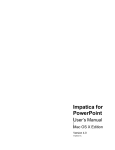




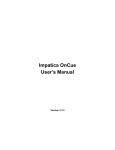

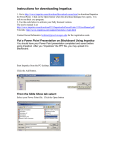
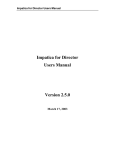





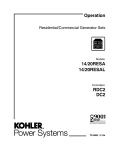
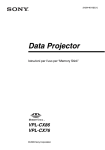
![1 Click the [OK] button.](http://vs1.manualzilla.com/store/data/005894494_1-d1f52ee6fd3b2146a5f252d3f1858c3b-150x150.png)

